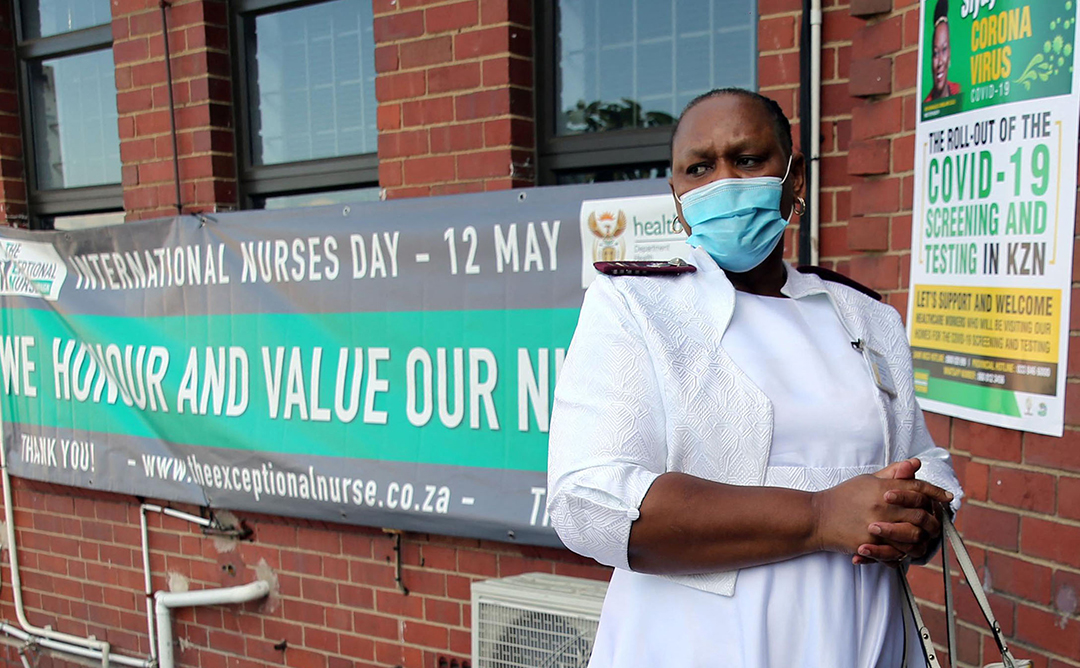ADF STAFF
From the earliest days of the COVID-19 pandemic, nurses have formed the foundation for the health systems across Africa — frequently putting their own lives on the line to treat community members infected by the coronavirus.
“They have shown remarkable resilience,” Winnifred Groves, a Cameroonian-born registered nurse, told the Brookings Institution in its Foresight Africa Podcast. “They’ve shown to be courageous. They’ve show to be selfless. They’ve shown to be versatile and to be problem-solvers.”
In the case of Cameroon, where the health care system is a patchwork of private hospitals, religious-run clinics, and for-profit pharmacies, nurses served on the frontlines of patient care in community-level clinics, Groves said.
Health care in Cameroon is hindered by the fact that as much as a third of facilities in the north of the country have been destroyed by fighting or lack supplies, Groves said.
A shortage of doctors means that nurses must do even more than their colleagues in other parts of the world. A shortage of basic medical equipment — and even electricity — means nurses must be creative and flexible as they address their patients’ needs, added Groves, a lecturer at Kingston University in London.
However, none of those experiences prepared Cameroon’s nurses for the rapid spread and dramatic impact of COVID-19.
In that respect, Cameroon’s experience has been reflected across Africa, where fragile health systems quickly found themselves struggling to provide enough protective equipment for staff members as well as enough oxygen and intensive care beds for patients.
In South Africa, mental and physical exhaustion often left hospitals short of nurses when they were most needed. That situation was compounded by staff members who came down with COVID-19 and had to quarantine. They were typically impossible to replace with nurses from elsewhere in the hospital because of similar shortages across the board, according to a survey of nurse managers conducted by the University of South Africa.
“I could not make an alternative allocation because there was a huge shortage of staff everywhere,” one nurse manager told researchers. “I could not even ask other wards to use their staff temporarily or have a substitute from other wards.”
In some cases, short-handed managers kept nurses on duty even as they waited for results of their own COVID-19 tests. At least one South African nurse remained on duty even after testing positive for the virus.
“I also tested but there was no one to relieve me,” a nurse manager told the University of South Africa interviewers. “I could not go home before receiving my results. I had to stay because there was just no one I could leave to manage the ward.”
According to researchers, nurses and managers who tested positive for COVID-19 faced stigma and discrimination. They also risked mental health problems due to the pressure and stress of their working conditions early in the pandemic.
Conditions worsened with South Africa’s second wave of COVID-19 infections, which struck primarily young people and also killed many health care workers, the study reported.
Despite their early difficulties confronting the pandemic, nurses persevered and found ways to rise above the limitations, Groves said.
As health systems responded to the pandemic by increasing protective equipment, oxygen and intensive care unit beds, nurses across Africa used technology such as online conferencing to learn from colleagues elsewhere on the continent and share their practices for treating patients.
“The use of technology is advanced now,” Groves said. Cameroonian nurses work with nurses in Nigeria, South Africa and elsewhere to improve their skills for dealing with COVID-19, she added.
Groves recommended that governments invest more heavily in training and technology to support their nurses. The pandemic has proven the power of nurses to keep their communities healthy and safe in the face of public health threats, she said.
“There is the idea of nurses being the doctors’ handmaidens,” Groves said. “That needs to be debunked.”


Comments are closed.